|
Edited by Jayne and Joseph Jackowitz; Consulting Editor, Krista Glen
Original Story Coordinator, Pauline Karani
In Africa's East lies Kenya, a sub-Saharan country with a
population of 34.7 million. The AIDS virus is taking its toll on the
citizens of Kenya – 1.2 million people, or 3.5 percent of the
population, are living with HIV/AIDS. In an effort to assist Kenya in
its fight against infectious diseases such as HIV/AIDS, WiRED has set
up Community Health Information Centers (CHICs) that serve
Kenya's grassroots populations by providing access to health
information for health workers, primary care givers, and young people.
Merging technology with a trained support team, these Centers enable
people to take responsibility for their own health and well-being, and
ultimately to recognize their ability to shape their own lives.
In 2001, WiRED began work on a network of health information centers in
Kenya, including 19 Community Health Information Centers. WiRED's
primary goal is to raise health standards of Kenyan communities, and
members of the community believe these Centers are ideal resources from
which to obtain current information about healthcare.
THE STORIES
It is difficult to comprehend the immense tragedy of AIDS as it sweeps
across Africa. While the devastating Bubonic Plague killed about 30
million people in medieval Europe, the United States Census Bureau
predicts that by 2010, sub-Saharan Africa will lose up to 71 million
people to AIDS.
The following stories, sent to us by CHIC visitors, staffers and
community members, reflect the anguish and sorrow, and the hope and joy
experienced among those familiar with WiRED's Centers. These
recollections describe the value of WiRED's programs, and show
how WiRED is offering an opportunity to those who have lost all
optimism to once again experience hope. Some of these stories below map
the lives of young people, many of whom have been orphaned or have
become infected with HIV. These children are destined to suffer the
same fate as their elders if they do not receive help in time.
ELEVEN-YEAR-OLD BOY SAVES HIS FAMILY FROM HIV/AIDS
By Mary Makokha, Program Manager
Rural Education and Economic Enhancement Program (REEP)
Confirming the popular notion that "information is
power," the story of 11-year-old Joseph is a testimony to WiRED's work in
this part of the world.
Joseph's aunt had been sick for an extended period of time, and, like
the rest of the family, Joseph was convinced that his former uncle's
family had bewitched his aunt. Several local "experts" had, in fact,
confirmed Joseph's belief and had prescribed several cures, including
animal sacrifices. These futile attempts to help his aunt occurred
before Joseph joined the peer educators' club in his school.
Members of the peer educators' clubs visit the Community Health
Information Center on a regular basis and then provide HIV/AIDS
prevention information to their peers. The oral education provided by
the young trainers is geared toward abstinence. During one of these
visits to the Center, Joseph read an HIV/AIDS CD-Rom from WiRED's
medical e-library. That experience changed his life. Although Joseph
was not allowed to participate in adult conversations, he found the
courage to state the words that saved his family. "I have seen my
 aunt's disease on the computer," Joseph told his stunned family. Before
anyone could stop him, Joseph advised them to secure an AIDS test.
Joseph's father had also suspected that his sister was suffering from
AIDS, but as he confessed, "I had no courage to suggest HIV testing."
His 11-year-old son gave him the courage to urge his family members to
heed Joseph's advice.
aunt's disease on the computer," Joseph told his stunned family. Before
anyone could stop him, Joseph advised them to secure an AIDS test.
Joseph's father had also suspected that his sister was suffering from
AIDS, but as he confessed, "I had no courage to suggest HIV testing."
His 11-year-old son gave him the courage to urge his family members to
heed Joseph's advice.
Joseph's father is most grateful for the Center, and now believes that
"it is very good for children to learn these things early in life so
they will grow up as responsible people."
^ Back to the Top
Full Text
A RAY OF HOPE
By Joseph Onduto, Kendu Bay CHIC Coordinator
Back in the days when dance clubs were called "discotheques" and secretaries
took shorthand, Jane Atieno was a remarkably beautiful woman, and all
who knew her when could attest to that. But the Jane we know now is a
pale reflection of her former self. She was infected with the HIV virus
and her condition has now developed into full-blown AIDS.
Jane originally came to the Kendu Bay CHIC looking for help. She says
that she is not afraid to talk about her past because she hopes that
she can encourage others living in the "fast lane" as she once did to
seek help or information.
Jane also believes that WiRED International is doing a great deal to
educate the community on the dangers of HIV/AIDS. She is coping with
her situation by getting a lot of help from WiRED, and frequents the
CHIC to access accurate information that she can, in turn, pass along
to the individuals she addresses. Although AIDS is draining Jane of the
physical beauty she once had, her inner beauty and strength is a ray of
hope to others.
^ Back to the Top
Full Text
REHABILITATION THROUGH KNOWLEDGE
By James Mwangi, Client Support Staff
Nakuru Community Health Information Center
One Wednesday morning, 12 uniformed teenage girls
entered our centre, and were accompanied by a gentleman who introduced
himself an administration official for the Nakuru Probation and
Rehabilitation Girls Centre.
The girls were placed into groups of three and each group sat in front
of a computer. Not all of the girls could understand English, so a
client support staff member helped the girls understand the material.
The groups looked through one CD regarding HIV/AIDS, all at the same
time, as the computer network was able to facilitate this continuity.
An additional advantage was that the girls were able to become more
familiar with the use of the computers and were able to navigate the
information.
The girls were astonished by the images they saw. This was evident by
their expressions of shock upon realizing the extent of the disease and
ensuing infection. They asked questions and discussed issues relating to
HIV/AIDS. Our observation about all of the girls was that they had a
special need for information about health – the information they
obtained from the CHIC was helpful, and we could tell from their
conversations that they planned to change their behavior.
^ Back to the Top
Full Text
DISABLED OUTREACH
By John Odour

I met a 17-year-old girl at Cheshire home and was impressed by the way
she was struggling to access HIV and AIDS information on the computer.
During her first visit, the young girl was not sure if she would be
able to get the information by herself. However, in her second visit
she took the mouse to point the curser to the icons on the monitor and
clicked it to open the tutorials on HIV and AIDS. I could see a broad
smile in her face, showing that she had made it at long last.
It's my wish you could see that smile from the young lady, speaking
louder than the words she was trying to stammer out. The smile showed
how joyous she was to get the HIV information from the latest
technology, provided by WiRED. The young girl was grateful for the
opportunity, and said it was first she had seen anything like it in her
lifetime. Viva, WIRED!
^ Back to the Top
Full Text
THE REAL SILENCE
By John Odour
On April 13, 2004, I attended a workshop organized by GRACE Africa, an
organization that helps to improve the education standard of deaf
people in Kenya. My attention was drawn to a young, deaf girl in her
late 20's, living with the HIV virus. As she explained her story in
sign language to me through a translator, her colleagues folded their
hands and paid intent attention in sadness and disbelief as they
learned about her situation.
One profound request she made, in sign language, was, "WiRED
International, if you could help, assist me with the proper information
on HIV and AIDS. Really I am in need of your assistance."
A chill went through me and I wondered how she would cope with the
virus and the disability. I could not help but think what a big
challenge in life she has, and what a double silent-life experience she
is going through!
^ Back to the Top
Full Text
INTERNATIONAL DAY FOR CAMPAIGN AGAINST DRUG ABUSE AND ILLEGAL TRAFFICKING
WiRED International – Kenya, will hold a discussion forum for youth
during the International Day for Campaign Against Drug Abuse and
Illegal Trafficking, at WiRED. The main facilitator will be Dr. Susan
Magada, Consultant Psychiatrist and drug specialist. During this forum,
WiRED will demonstrate the use of information technology to disseminate
vital health information to every age cohort in the community.
Since drug abuse and HIV infection are closely related, WiRED will also
provide important information on HIV/AIDS and other STDs to the youth
during this event.
^ Back to the Top
PDF File
I AM A PEER EDUCATOR AND PROUD OF IT!
By James Omondi Ouko
Pandipieri CHIC
The computerized health information center is one of
the best things to happen to our community. The facility empowers the
youth, especially those who have been marginalized. It provides accurate
and current information on matters pertaining to health. As a peer
educator, I am a strong advocate for increased focus on working with the
youth, youth groups, peer education and advocacy clubs in schools and
community. By working with these groups, we will disseminate information
and knowledge to grassroots beneficiaries.
Many youth come to me for guidance and I am very happy that I am
contributing positively to my community. Because of this I always thank
my God for having brought WiRED International to us. I am now a person
of value and I strive to excel.
^ Back to the Top
Full Text
WiRED WORKING WITH PEOPLE WITH HIV/AIDS
By James Mwangi
My name is James Mwangi. I am 29 years old and I am living with HIV.
Throughout my school life, I never had access to detailed information
about HIV/AIDS and other sexually transmitted infections. My parents
never discussed sex with my siblings and me.
At home everyone was afraid of me after I learned I was infected with
the virus. They set separate utensils and a washing basin for me. I
felt stigmatized and became very traumatized. I joined a group of young
people known as Appropriate Grassroots Initiatives (AGRI). Their
objective is to advocate for behavior change and improve access to
HIV/AIDS care and support services to the infected and affected.
In 2003, AGRI, in partnership with WiRED International, opened up a
community health information center (CHIC) at the AGRI offices in
Nakuru. Here the community accesses health information free of charge.
AGRI also integrated a voluntary counseling and testing (VCT) site.
WiRED International, through other organizations in Kenya and
elsewhere, have put up many CHICS. I thank both WIRED and AGRI. Thumbs
up for AGRI and WIRED International! If there had been information
centers like CHIC where people can freely access information on health
including HIV/AIDS and even STDs, before I became infected with HIV,
then perhaps I wouldn't have become infected.
^ Back to the Top
Full Text
WiRED INTERNATIONAL: AN APPROPRATE WAY TO REACH ADOLESCENTS
By Phinehas Muthuri
Maua Community Health Information Center
WiRED International has created and delivered an appropriate way to reach
adolescents with the facts of HIV/AIDS and other health issues. CD-ROMS
present extensive information in a straightforward, factual manner that
adolescents can understand and accept.
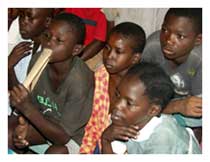
There is room for interactive dialogue and suggestions from the youth.
There is sufficient information on birth control, books and alcohol,
munchies, sexually transmitted infections including HIV/AIDS, sexual
decisions, and student stress. Facts and myths on HIV/AIDS and
sexuality are covered in great detail. There is a great deal of
information on tobacco and alcohol consumption. The needs of medical
and nursing students are adequately addressed. Acute respiratory
infections, malaria, diarrheal diseases and many other health
conditions are well covered. With WiRED, college and university
students have acquired wonderful 'lecturers' on the CD-ROMS. Research
work is now made easy.
Talk of free health education and you'll find it at WiRED Community
Health Information Centers (CHICs). We are receiving the information
absolutely free of charge.
At last the youth have a reason to smile and take courage that they
understand important health issues. The materials are suitable for all
ages, not just adolescents. At the age of 84+, just like at 9, many
people comfortably learn at CHICs. Learning is at one's own pace and
timing. Community health workers as well as traditional herbalists
benefit from the information. Traditional birth attendants gain a lot.
There are no barriers whatsoever. We at Maua Methodist Hospital-Meru
CHIC join the rest of WiRED family to welcome all to the CHICs. Keep up
the good work, WiRED!
^ Back to the Top
Full Text
COMMERCIAL SEX WORKERS: SUFFERING FROM AN ACUTE DEFICIENCY OF HEALTH INFORMATION
By Erustus Omondi
Migori Community Health Information Center

Reaching Commercial Sex Workers (CSWs) has been, for us, a very
challenging task. Very proudly we are excited to announce the beginning
of a helping relationship with them. The foundation of our success was
built on an effort to understand this group of people. This, we did by
way of an informal listening survey.
It's quite encouraging that we recorded a positive response from the
bar owners and managers. They believed that the center would be of
great help to the CSWs who, they said, were suffering from an "acute
deficiency of health information." They identified unwanted
pregnancies, HIV/AIDS and other Sexually Transmitted Diseases as the
main health problems of the "bar workers."
Ultimately, we attribute the success of the intervention to WiRED's
belief that the axis of an effective social marketing strategy evolves
around beneficiary involvement and a sustained interest in education
campaigns.
^ Back to the Top
Full Text
KIAMBU YOUTH REACHING THE UNREACHABLE
By Pauline Karani, WiRED Program Manager
The youth in Kiambu, Kenya, came together with the aim to fight the
spread of HIV/AIDS in their community. Tired of seeing their parents,
brothers and sisters die of the disease, they decided they would do all
in their power to stop this disease….
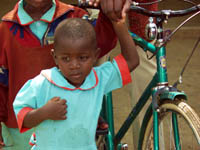
With the help of WiRED International and The Firelight Foundation, the
group was trained in the use of information technology and a WiRED
Community Health Information Center was established in their area. Each
month the Center receives more than 600 visitors. To these youth,
serving the community is a most fulfilling experience. One of them,
Bernard Maracha, said, "I have found that I am not just an assistant to
the clients. I am also a friend, a confidant, a shoulder to cry on, a
teacher, a sounding board – practically everything. I love my
work and the more people I see accessing health information, the more
fulfilled I feel."
John Oduor, another of the Kiambu youth, spearheaded the development of
a health information program specifically for the disabled and their
caregivers. This WiRED program is based on the following objectives: To
create awareness among the disabled about diseases like HIV/AIDS/STDs,
and other health issues/information; To provide caregivers with skills
that enable them to conduct their roles effectively and confidently; To
reduce marginalization of the disabled and close their information gap;
To improve the accessibility to health information to the disabled; To
create forums that encourage discussions about disabilities and reduce
stigma; and To intensify the participation and integration of disabled
individuals into existing health information programs.
Each of the WiRED Community Health Information Centers in Kenya is now
making special efforts to reach the disabled.
^ Back to the Top
Full Text
LIVING POSITIVELY
By Muratanya Reuben, Client Support Staff
Maua Community Health Information Center
Edited by Evelyn Beck

A young couple visited the Maua - Meru Community Health Information
Center (CHIC) and requested that they access information on HIV/AIDS.
As the client support staffer took them through the CD, he learnt that
the couple was married and they were both HIV positive.
"I look forward to seeing this couple healthier and stronger in the
future. This will be a testimony that WiRED CHICs are not established in
vain," said the client support staff member.
^ Back to the Top
Full Text
NOW WE KNOW WHAT OUR DAD IS SUFFERING FROM
By Anthony Mwaro
Community Health Information Center Client, Mombasa
Edited by Evelyn Beck
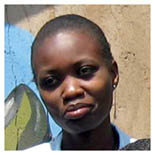
Two months ago my father was suffering from severe
leg pains. He consulted a doctor and was diagnosed with "intermittent
claudication," and was scheduled for an operation.
We had never heard of such a disease, so I paid a visit to the WiRED
Centre in Mombasa, where I accessed all the information that I needed
to know about this illness. I learned how one gets it, the prevention
measures and the required treatment.
This information came in handy because we were able to know what steps
to take, the decisions to make, and what exactly would happen during
the operation that my father was soon undergo.
Thank you, WiRED; because of you our family is better informed now.
^ Back to the Top
Full Text
COMMUNITY HEALTH INFORMATION CENTER VOLUNTEERS: THE 'HEARTS AND SOULS' OF THE CENTERS
By Pauline Karani
Edited by Pauline Bunyasi
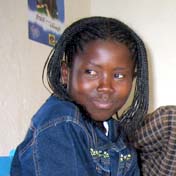
Popularly known as "the Computer place," WiRED
International's Community Health Information Center (CHIC) in Butula is
proving to be the best strategy for fighting AIDS.
All manner of people walk into the WiRED Community Health Information
Centers (CHICs) in search of information. The WiRED volunteers serve
them all with enthusiasm. Perhaps the information they give will save
one of their own from the curse of ignorance. An informed society, they
believe, is a liberated society. The Centers are about more than
computers; they are about people – both the information seekers
and the information givers.
^ Back to the Top
Full Text
BUTULA TRADITIONAL HEALERS ACQUIRE A NEW STATUS
By Mary Makokha, Program Manager
Rural Education and Economic Enhancement Program (REEP)
Mwanaisha Narotso wears many masks. She not only
sells fruit and grains at the local market but she is also a well-known
traditional birth attendant and a herbalist.
Like other herbalists, Mwanaisha deeply believes in her traditional
cultural practices. Her work as a traditional birth attendant is
revered in the community, but now carries associated risks because of
the HIV virus.
WiRED's Community Health Information Centers have special programs for
herbalists because some of the herbalists' traditions unknowingly
contribute to the spread of HIV. The herbalists now visit the Center's
medical e-library twice per week for ongoing training and to share
information with herbalists in other communities.
In addition to learning about the causes and treatment of HIV and AIDS,
the herbalists have increased their general knowledge about herbs and
diseases.
^ Back to the Top
Full Text
PERISHING FOR LACK OF KNOWLEDGE
Sister Bernadette Nealon, Program Manager of the Community Health Program in
Kisumu, Kenya—where one of WiRED's Community Health Information
Centers is located—related this account to Pauline Karani, WiRED's
Administrative Manager.
The man walked slowly, seemingly in pain, into WiRED's Community Health
Information Center (CHIC) in Kisumu. The staff member spoke gently and
inquired what kind of information the man wanted. "I need to know about
sexually transmitted diseases and AIDS," he replied.
The man earnestly explained his predicament to the staff member. He had
been suffering from painful symptoms for several weeks, but was too
ashamed to ask anyone for help. He had lost hope and thought he was
going to die. When he heard about CHIC he decided to see if he could
get any sort of information that might help.
He would have died in pain and hopelessness, if not for the information
provided by CHIC. His is only one of many stories; rural Kenyans rely
on CHIC for a broad spectrum of health information needs. With your
generous support, WiRED can expand these services, and bring them to
parts of Kenya that lack even the most basic health information. Please
help WiRED help others from perishing for lack of knowledge.
^ Back to the Top
Full Text
WIRED'S COMMUNITY HEALTH INFORMATION CENTERS:
EVIDENCE OF IMPACT AT THE GRASS ROOTS
by Barbara Yates, R.N., WiRED Volunteer

Teachers are using the HIV/AIDS files for additional information to add
to the required HIV/AIDS curriculum just initiated throughout Kenya.
Local public health officers – to fulfill their requirement to
alert people to the dangers of HIV/AIDS – are also visiting the
Centers to increase their own knowledge. For them, the Community Health
Information Centers are a primary source of information. The Ministry
of Health representative in charge of the Busia district described the
Centers as "a unique strategy of information dissemination" and
expressed hope that another Center would be set up in the district
headquarters' main hospital. So, the question is, Are the Centers
having an impact? From this nurses' viewpoint, they are having more of
an impact that we could have ever imagined.
^ Back to the Top
Full Text
MEDICINE AT WIRED'S COMMUNITY HEALTH INFORMATION CENTERS: WHERE TRADITION MEETS TECHNOLOGY
WiRED, Euroregional Commission and Tuzla Medical School join in the celebration...

They serve as midwives in their villages, and they are fervently
searching for ways to prevent transmission of HIV from mother to child
during birth. With the new information they are able to gain at the
Centers, they will be prepared to use their traditional, respected role
in the community to make a persuasive case to their village for safe
practices that will prevent continued spread of HIV.
African physicians trained in Western medicine find WiRED Information
Centers valuable resources, as well. For many of the doctors, the new
CD-ROMS are the only source of updated materials they have.
Now that physicians have become familiar with the Center resources,
they are sending patients directly to the Centers to sit through
tutorials that address the patient's particular problem.
Many of the young teens who come to the center are orphans; all of them
have seen someone's parents die from AIDS. The center provides the teens
with a tutorial that explains in detail how HIV transmission occurs and
what steps they must take to avoid contracting the disease.
Community leaders come to the centers looking for ways to cope with the
AIDS crises. They watch a deteriorating human resources infrastructure.
Because AIDS appears most easily in the young, most sexually active
segment of the population, a large part of a generation's youthful
energy, skills and productivity is being lost. The community leaders
realize that containing the AIDS crisis is one of their most urgent
tasks.
^ Back to the Top
Full Text
WIRED'S COMMUNITY HEALTH INFORMATION CENTERS:
TRADITIONAL HEALERS BENEFIT FROM TECHNOLOGY
by Pauline Karani, Administrative Manager
WiRED Community Health Information Centers, Kenya
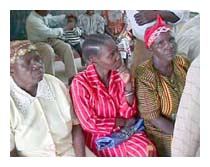
In a remote area of Western Kenya is a small village called Butula.
Here, the villagers, most of whom are illiterate or semi-literate, met
with great jubilation and enthusiasm the installation of four computers
by WiRED International. The Community Health Information Center is in
one of the few rooms with electricity. The village is so remote that
you still bring the telephones to life by cranking them, and
electricity is still seen as a rare commodity.
For the first time ever, a group of traditional healers and birth
attendants have come together to share experiences and information and
to get medical updates, especially on HIV/AIDS, using computer
technology at the Community Health Information Centers. This, despite
the fact that for many generations they have kept their knowledge and
information family secrets.
Upon the opening of the Community health Information Centers (CHICs) in
February 2002, these traditional practitioners have united and formed a
group to access information in order to improve their skills and
knowledge.
They said because of the formation of the Community Health Information
Centers, they had for the first time ever agreed to unite, share and
access information together in order to help raise the standards of
living and the level of health care of their people.
On our second site visit in March, it was a delight to learn that the
traditional healers have become regular visitors to the Center! It
offered proof these "grassroots" Health Centers are indeed providing a
link to the outside world and to information from those with whom they
would otherwise not have regular access. Through these links, untold
members of the community are being assisted in learning about current
health issues and especially HIV/AIDS developments with new
information. It is often said that information is power, and the truth
of this saying can be seen clearly emerging from the establishment of
these Community Health Information Centers that are a great tool for
the communities they serve. One thing is for sure, the WiRED Centers
are making history, if not yet in the entire country of Kenya, at least
in one village called Butula!
^ Back to the Top
Full Text
AIDS COMMUNITY HEALTH INFORMATION CENTERS INITIATED
By Brian Jacobson
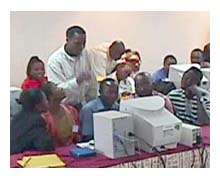
A recent Washington Post study estimates that currently 5,500 people
die of AIDS in Africa each day. The study goes on to project that by
2010 the daily death toll will increase to 13,000 Africans, day after
day. Already, 13.2 million orphans have been left by the AIDS epidemic;
by 2010, estimates project 42 million orphans.
The life expectancy in southeastern Africa has dropped from a 65- to
70-year range to less than 40 years. More than half of the 60 million
Africans who have become infected with HIV in the past 20 years acquired
the virus when they were between the ages of 15 and 24. The UN estimates
that in sub-Saharan Africa, over eight million youth now have AIDS.
The WiRED community resource centers provide up-to-date information on
an extensive CD-ROM collection compiled by WiRED from the latest AIDS
material available from government institutions, public research
groups, and companies involved in AIDS-related research. The CD
collection also includes a comprehensive library of medical conditions,
treatments and prevention techniques for illnesses common to the region.
Professional medical staff, home healthcare workers responsible for the
care of family members with AIDS, and young people looking for HIV/AIDS
prevention information will all have access to the resource center.
Many of the coordinators were left orphans at a young age. They sensed
immediately the importance of having up-to-date facts to use in the
treatment of AIDS and in the ongoing efforts to prevent the spread of
HIV infection.
^ Back to the Top
Full Text
WIRED PROVIDES REAL HOPE AND GENUINE PROMISE FOR ORPHANS IN KENYA
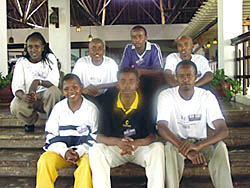
John, Paul, Triza, Joseph, Susan, Francis and Benard are orphans who
spend their days in Kiambu, a massive slum on the outskirts of Nairobi,
Kenya. They lost their parents to the AIDS epidemic. Losing hope and
lacking skills in a country suffering from high unemployment and a
rising level of poverty, they were eager to learn new skills that would
help them create a secure future. WiRED provided that opportunity in
March when it teamed with Global Strategies for HIV Prevention to
provide these young people with access to a resource that is becoming a
necessity to economic, political and social life everywhere in the
world. The computer education and skill development will connect these
orphans to the outside world and contribute to their self-sufficiency.
These young people had never before seen a computer, and that created a
challenge. In their week-long training session, the objective was to
determine if WiRED could take complete novices from zero to sixty in
four days – from no knowledge to the cultivation of skills
adequate to search the Web, use e-mail (with attachments), run a word
processor (including text and graphics integration) and handle a
graphics design package. Beyond that, could WiRED teach these young
people to train others?
The results were striking. By the end of the week, the students had
acquired a remarkable set of computer skills. The computers are now
housed in a community church so these orphans can train younger
children and use their new computer skills for AIDS education and
economic development.
^ Back to the Top
Full Text
HOW THE MESSAGE ABOUT AIDS TRAVELS
Related to Pauline Karani by Mary Makokha,
Coordinator of the Rural Education and Economic Enhancement Program (REEP)
Recently, three young men came to the Butula
Community Health Information Center (CHIC) just to satisfy their
curiosity.
These days, the topic of conversation around town is the new Center.
Even in most homes, conversations for the past months have revolved
around the Center's activities.
People are very surprised to find that the computers actually show
pictures of diseases and have audio explanations of the details
highlighted in the photos. After seeing the CD-ROM tutorial on ukimwi,
Kiswahili for AIDS, they often tell their friends and family, "After
you see the one on ukimwi you will never be the same again!"
While going through several of the CD-ROMs, the three young men
recognized their brother's illness in one of them. Early the next day
the three youths put their sick brother on a bicycle and wheeled him to
the counseling center. The counselors met with the brother and advised
him to have an HIV test. He agreed to this and was found to be HIV
positive.
They went home with mixed feelings; they were happy that they did not
have the virus and yet sad for they knew they did not have long before
their brother died. He was, after all, in the last stage of AIDS. As
they were leaving the Center, one of them mused, "Maybe if the Center
had been established much earlier their brother would have been saved
from the virus." Perhaps.
^ Back to the Top
Full Text
SHARED VISION BRINGS WIRED TO KENYA
From the moment Kenya gained independence in 1963,
local and national leaders have envisioned a day when the country could
finally eradicate poverty, ignorance, and disease.
In 2001, WiRED became an ally in Kenya's fight against poverty,
ignorance, and disease. WiRED's mission – to provide information
and communication resources to disadvantaged people around the world
– fits perfectly with Kenya's long-held vision and its present
day needs.
In Kilifi, a young laboratory technician, Edwin Mwayongo goes to the
Center to review CHIC information sources to keep informed on medical
innovations in his area of work. With this knowledge, he hopes to
upgrade his education from his present certificate level to a diploma
or even a degree. Edwin says, "The Center is a godsend. I view it as a
way to keep current in my field and as preparation for more formal
education."
The need for more Centers in other parts of the country cannot be
overemphasized. An expanded network of Centers will give Kenya a
powerful tool to use in reaching for that long-held vision-a nation
free from poverty, ignorance, and disease.
People are very surprised to find that the computers actually show
pictures of diseases and have audio explanations of the details
highlighted in the photos. After seeing the CD-ROM tutorial on ukimwi,
Kiswahili for AIDS, they often tell their friends and family, "After
you see the one on ukimwi you will never be the same again!"
^ Back to the Top
Full Text
Nancy's Experience at the Kibera Community Health Information Center (CHIC)
By Zipporah Wanaswa, WiRED Regional Manager
Kibera slum houses almost two thirds of the poor population in Nairobi City. It is the largest slum in Africa with a population of more than 800,000. Most of the people cannot afford fees to access computer agencies or cyber cafés. They spend most of their time working hard to fend for their families. In an attempt to raise an income, most of the people, especially women and young girls, end up in prostitution. As a result, most of the population in this region is vulnerable to HIV and many other infections. This is where Anne, one of the client support staff at the Kibera CHIC, had an encounter with Nancy* a 41-year old woman and Miriam* her daughter aged 15.
Nancy and Miriam had both visited the center to access health information. Nancy requested to look at the CD-ROM on Sexually Transmitted Infections (STI). Anne assisted her in using the CD-ROM but Nancy was rather hesitant to look at the information. Upon inquiring, Anne found out that the woman did not want to read through the CD-ROM with her daughter watching. She did not give reasons why.
The CHIC Volunteer set up a separate computer for Miriam who wanted to learn more about Malaria, while her mother went on to look at the CD-ROM on STIs. At the close of the session, Anne developed a rapport with Nancy, who revealed that she suspected she had STI, but did not want to disclose this to her daughter. It was then that Anne understood the woman's predicament, so she referred her to the clinic run by a community-based organization affiliated with WiRED, the Kibera Community Self Help Project (KICOSHEP). Nancy was subsequently diagnosed with an STI and is now undergoing treatment and counseling.
^ Back to the Top
*(not their real names)
Sex Worker Renewed
By Miriam Kamau
Nakuru Community Health Information Center Volunteer
A middle-aged woman walked into the Nakuru CHIC site and inquired about our services. At some point she asked me, "What is the Center all about? Is it some sort of a clinic?" I did my best to explain. Once she understood, she settled down to access information. She was most interested in the CD-ROM about Sexually Transmitted Infections (STIs). I guided her through the CD. In the course of our conversations I established she had symptoms of a sexually transmitted infection.
She confided in me and told me that she engaged in commercial sex. I informed her about safer sex practices and referred her for HIV/STI testing. A few weeks later the lady came back to the CHIC and has now become a regular client learning about many other health issues—especially reproductive health. In addition, she has now started selling vegetables as an alternative to commercial sex work.
^ Back to the Top
Saved by a CD-ROM
By James Dikir
Kajiado Community Health Information Center Volunteer
One bright April morning a young man walked into the WiRED Center in Kajiado and went straight to a computer that was not being used. While seated, he went through the CD list and settled on the STI CD. Being familiar with the computer and CD operation, he did not require any assistance in accessing the information. He went through the CD for 60 minutes. After he had finished, he informed one of the client support staff that he had learned of some infectious signs and symptoms that were similar to the ones he was experiencing. He promised to consult a doctor.
After one week, the client support staff made a follow-up on his progress. She learned from him that he had seen a doctor in a private clinic who took specimens for examination. Thereafter, he was treated with oral and injectable antibiotics. He was advised to take his wife for medical examination so that the problem could be solved once and for all.
We are delighted to know that the information in the Center is helping our clients learn about infections and their bodies - enabling them make wise decisions.
^ Back to the Top
Information on Diabetes
By Cleophas Muliro
A Community Health Information Center client
I have been Diabetic for about a year now. We have a family history of diabetes and I am the fourth in a family of twelve to be diagnosed with the disease.
I came across a poster at the entrance of the Sheetal Plaza building in Mombasa and read about the information services at the CHIC. The reception of the staff and the quality of the information were impressive. I am happy that I have accessed very important detailed information from the Center that I had never gotten from my doctors; (e.g., healthy living, blood sugar levels, cholesterol levels, heart and general complications a diabetic person is likely to undergo with poor blood sugar controls).
I will be a regular visitor and even download more information to take to my family members who also suffer from Diabetes.
^ Back to the Top
Editors' note: This collection of essays was written by average
people who have visited or served as counselors at WiRED's
Community Health Information Centers (CHICs) throughout Kenya. The CHIC
program is an innovation in dispensing information about HIV/AIDS and
other critical health issues to grassroots communities. These Centers
integrate computer technology, counselor support and a wide array of
community resources in the fight against AIDS in Africa. The essays
were written by Kenyans. Their stories are sometime humorous and
sometimes tragic, but they all express hope, and they all come from the
heart. The stories have been edited for length.
^ Back to the Top
Our Kenya details page can be found here.
|


 aunt's disease on the computer," Joseph told his stunned family. Before
anyone could stop him, Joseph advised them to secure an AIDS test.
Joseph's father had also suspected that his sister was suffering from
AIDS, but as he confessed, "I had no courage to suggest HIV testing."
His 11-year-old son gave him the courage to urge his family members to
heed Joseph's advice.
aunt's disease on the computer," Joseph told his stunned family. Before
anyone could stop him, Joseph advised them to secure an AIDS test.
Joseph's father had also suspected that his sister was suffering from
AIDS, but as he confessed, "I had no courage to suggest HIV testing."
His 11-year-old son gave him the courage to urge his family members to
heed Joseph's advice.










